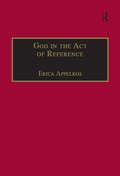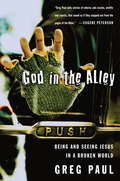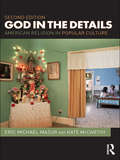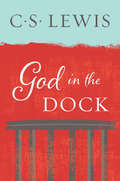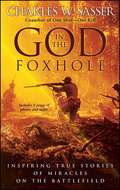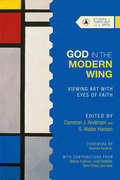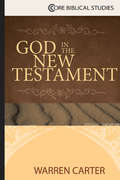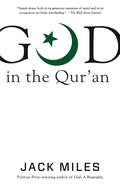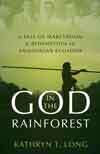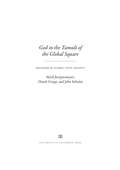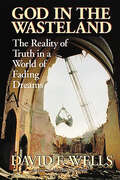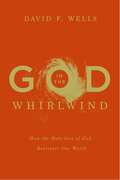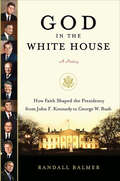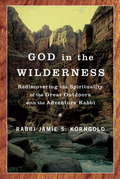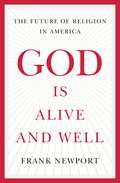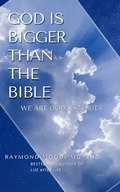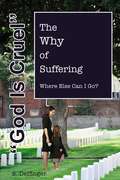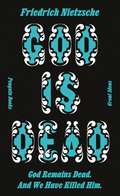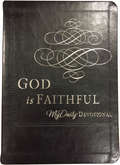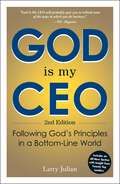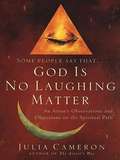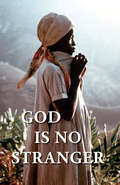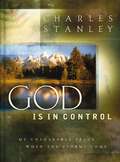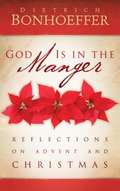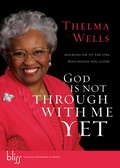- Table View
- List View
God in the Act of Reference: Debating Religious Realism and Non-Realism (Routledge New Critical Thinking in Religion, Theology and Biblical Studies)
by Erica AppelrosTo claim to believe in God without accepting that God exists independently of human minds would mean reducing God to merely a human construct, thus not real enough for being the object of religious worship. This book sets out to challenge this common view on existence and religious belief. Arguing from concrete examples of language use in children's make-believe play and other ordinary situations, Erica Appelros suggests that what makes us consider something to be real involves our capacities to relate to our surroundings - not only on grounds of their physical characteristics but also on grounds of human construction. This book makes a substantial contribution to the contemporary debate within philosophy of religion on religious realism and non-realism, and suggests innovative and constructive solutions to the perennial philosophical and religious issue of what is meant by talking about God and God's existence.
God in the Alley: BEING AND SEEING JESUS IN A BROKEN WORLD
by Greg Paul“Greg Paul tells of whores and crazies, misfits and rejects that sound as if they stepped out from the pages of the Bible. ”–Eugene Peterson Sam has survived physical, sexual, and substance abuse, terrible violence, and life on the streets. Wendy lives for the next high on crack, oblivious to her boyfriend’s love. Neil is dying of AIDS. These are the people of inner-city Toronto. Look into their distorted, obscure faces, their fractured lives, and catch a glimpse of the sublime. Greg Paul calls them tragic heroes–individuals who can offer a testament to God’s love and mercy. With emotional depth and spiritual intensity, Greg’s compelling stories reveal that people with desperate lives have precious lessons to teach us about the character of God. God in the Alleyoffers a profound message of grace and calling that each one of us needs to hear. “The experience of reading this book haunts, convicts, delights. But one thing is for sure: you don’t want to miss it. ” –Mark Buchanan, author ofThe Holy Wild: Trusting God in Everything “Greg Paul writes beautifully and welcomes us into the life he lives. … I am grateful to have read this book. ” –David Wilcox, musician, songwriter, and storyteller “I dare you to read this book at more than one sitting. Each page is a seat belt that straps you in and the turning of the page pulls the straps tighter. When the ride is over, you’ll want to start again. ” –Leonard Sweet, author of numerous books includingSoul Tsunami From the Trade Paperback edition.
God in the Details: American Religion in Popular Culture
by Eric Mazur Kate MccarthyExploring the blurred boundary between religion and pop culture, God in the Details offers a provocative look at the breadth and persistence of religious themes in the American consciousness. This new edition reflects the explosion of online activity since the first edition, including chapters on the spiritual implications of social networking sites, and the hazy line between real and virtual religious life in the online community Second Life. Also new to this edition are chapters on the migration of black male expression from churches to athletic stadiums, new configurations of the sacred and the commercial, and post 9/11 spirituality and religious redemption through an analysis of vampire drama, True Blood. Popular chapters on media, sports, and other pop culture experiences have been revised and updated, making this an invaluable resource for students and scholars alike.
God in the Dock
by C. S. LewisGod in the Dock is one of the best known of C.S. Lewis's collections of essays and includes Myth Become Fact, The Grand Miracle, Priestesses in the Church and, of course, God in the Dock.
God in the Foxhole: Inspiring True Stories of Miracles on the Battlefield
by Charles W. SasserFrom veteran military writer Charles Sasser comes a collection of inspiring personal accounts of American soldiers whose faith has guided them through the hardships of war.From the battlefields of the American Civil War through World Wars I and II, from Korea and Vietnam to the front lines in Iraq and Afghanistan, soldiers of all faiths have struggled for understanding and called on a higher power when faced with the realities of combat. God in the Foxhole is a stunning collection of true personal accounts from generations of American soldiers whose faith, in the words of author Charles W. Sasser, "has been born, reborn, tested, sustained, verified, or transformed under fire." A renowned master of combat journalism and a former Green Beret, Sasser has gathered an immensely moving collection of war stories like no other—stories of spirituality, conversion, and miracles from the battlefield. Be they Christian, Jewish, Muslim, or atheist, churched since childhood or touched by the divine for the first time, here are the riveting experiences of army privates, bomber pilots, navy lieutenants, marines, prisoners of war, medics, nurses, chaplains, and others who, under desperate circumstances and with every reason to fear for their lives, found unknown strength, courage, and heroism through their remarkable faith. These inspiring accounts transcend the explainable to become stunning portraits of survival and belief: the angelic vision that brought inner peace to an exhausted helicopter door gunner in Vietnam; the makeshift full-immersion baptisms of eleven soldiers on Palm Sunday in Iraq, 2004; two enemies—a Nazi priest and an American G.I.—who served Communion Mass in a Belgian sanctuary in 1944; the prescient letter from a Civil War army major to his beloved wife, one week before his death at Bull Run; the 21st-century toddler with a jaw-dropping spiritual connection to a war hero of Iwo Jima, and dozens more. A war chronicle like no other, God in the Foxhole affirms, for military buffs and readers from all walks of life, the power of faith in the face of adversity.
God in the Modern Wing: Viewing Art with Eyes of Faith (Studies in Theology and the Arts Series)
by G. Walter Hansen Cameron J. Anderson Cameron J. Anderson, G. Walter HansenShould Christians even bother with the modern wing at the art museum? After all, modern art and artists are often caricatured as rabidly opposed to God, the church—indeed, to faith of any kind. But is that all there is to the story? In this Studies in Theology and the Arts volume, coeditors Cameron J. Anderson and G. Walter Hansen gather the reflections of artists, art historians, and theologians who collectively offer a more complicated narrative of the history of modern art and its place in the Christian life. Here, readers will find insights on the work and faith of artists including Marc Chagall, Jackson Pollock, Mark Rothko, Andy Warhol, and more. For those willing to look with eyes of faith, they may just find that God is present in the modern wing too.
God in the New Testament (Core Biblical Studies)
by Warren CarterAuthor Warren Carter addresses the ways in which New Testament writings present Godby asking four questions about how God relates to others: How is Godpresented in relation to Israel? How is God presented in relation toJesus and the Spirit? How is God presented in relation tobelievers/disciples/the church? How is God presented in relation to "theworld"? Carter uses these questions to help draw out the most importantfactors in each of the New Testament writings discussed."Rarelydoes one exclaim, "This is a real page-turner!" when describing a bookon the New Testament—but I must say it. With his characteristicconcision and clarity, not to mention wit and conversational style,Carter leads us on a tour of "God-at-Work" in fifteen closely-readtexts. What claims do the various texts make about God? What questionsor "red flags" do these texts raise? What effect do or should thesetexts have upon us as readers today?Carter intrepidly takes up someof the more challenging and cryptic NT texts and asks aloud many of theuncomfortable questions we’ve wondered about but might not have voicedso pointedly. He does not provide tidy answers, but his approach enticesus not to give up, but rather to dive even deeper into the texts, theirworld, and ours. In reading this book, I was variously educated,entertained, challenged, and even moved." -Jaime Clark-SolesProfessor of New Testament and Altshuler Distinguished Teaching Professor,Perkins School of Theology, Southern Methodist University, Dallas, Texas
God in the Qur'an (God in Three Classic Scriptures)
by Jack Miles"Reading this book could be a crucial step out of ignorance at a time of rising Islamophobia." --Ron Charles, The Washington PostFrom the Pulitzer Prize-winning author of God: A Biography, an erudite, hugely informative portrait of the God of Islam, the world's second largest, fastest-growing, and perhaps most tragically misunderstood religion.Who is Allah? What makes Him unique? And what does He ask of those who submit to His teachings? In the spirit of his Pulitzer Prize-winning God, a trailblazing "biography" of the protagonist of the Old Testament, and Christ, his brilliant portrait of biblical Jesus, acclaimed religious scholar Jack Miles undertakes to answer these questions with his characteristic perspicacity, intelligence, and command of the subject. Miles depicts a "character" less mercurial than Yahweh, less ready to forgive than Christ, and yet emphatically part of their traditions. The God of the Qur'an revises and perfects: His purpose is to make whole what had been corrupted or lost from the practices and scriptures of the earlier Abrahamic religions. Setting passages from the Hebrew Bible, the New Testament, and the Qur'an side by side, Miles illuminates what is unique about Allah, His teachings and His temperament, and in doing so revises that which is false, distorted, or simply absent from our conception of the heart of Islam. Miles writes, "I hope [that by reading this book] you may find it a little easier to trust the Muslim next door, thinking of him as someone whose religion, after all, may not be so wildly unreasonable that someone holding to it could not be a trusted friend."
God in the Rainforest: A Tale of Martyrdom and Redemption in Amazonian Ecuador
by Kathryn T. LongIn January of 1956, five young evangelical missionaries were speared to death by a band of the Waorani people in the Ecuadorian Amazon. Two years later, two missionary women--the widow of one of the slain men and the sister of another--with the help of a Wao woman were able to establish peaceful relations with the same people who had killed their loved ones. The highly publicized deaths of the five men and the subsequent efforts to Christianize the Waorani quickly became the defining missionary narrative for American evangelicals during the second half of the twentieth century. God in the Rainforest traces the formation of this story and shows how Protestant missionary work among the Waorani came to be one of the missions most celebrated by Evangelicals and most severely criticized by anthropologists and others who accused missionaries of destroying the indigenous culture. Kathryn T. Long offers a study of the complexities of world Christianity at the ground level for indigenous peoples and for missionaries, anthropologists, environmentalists, and other outsiders. For the first time, Long brings together these competing actors and agendas to reveal one example of an indigenous people caught in the cross-hairs of globalization.
God in the Tumult of the Global Square: Religion in Global Civil Society
by Mark Juergensmeyer Dinah Griego John SoboslaiHow is religion changing in the twenty-first century? In the global era, religion has leapt onto the world stage, though often in contradictory ways. Some religious activists are antagonistic and engage in protests, violent acts, and political challenges. Others are positive and help to shape an emerging transnational civil society. A new global religion may be in the making, providing a moral and spiritual basis for a worldwide community of concern about environmental issues, human rights, and international peace. God in the Tumult of the Global Square explores all of these directions, based on a five-year Luce Foundation project that involved religious leaders, scholars, and public figures in workshops held in Cairo, Moscow, Delhi, Shanghai, Buenos Aires, and Santa Barbara. In this book, the voices of these religious observers around the world express both the hopes and fears about new forms of religion in the global age.
God in the Wasteland: The Reality of Truth in a World of Fading Dreams
by David F. WellsHere is the much-anticipated sequel to David F. Wells' widely praised book No Place for Truth, which garnered multiple "Book of the Year" awards from Christianity Today. Building on the trenchant cultural and religious analyses of evangelical Protestantism set forth in his first volume, Wells argues in God in the Wasteland that the church is now enfeebled because it has lost its sense of God's sovereignty and holiness. God, says Wells, has become weightless. He has lost the power to shape the church's character, outlook, and practice. By looking afresh at the way God's transcendence and immanence have been taken captive by modern appetites, Wells is able to argue for a reform of the evangelical world--a reform without which evangelical faith will be lost--and develop a powerful biblical antidote to the modernity which has invaded the church.
God in the Whirlwind: How the Holy-love of God Reorients Our World
by David F. WellsOffering a remedy for evangelicalism's superficial theology, Wells points readers to the paradox of God's "holy-love," exploring how the interplay of his characteristics reorient our lives and change the world.
God in the White House: A History
by Randall Herbert BalmerHow did we go from John F. Kennedy declaring that religion should play no role in the elections to Bush saying, "I believe that God wants me to be president"?Historian Randall Balmer takes us on a tour of presidential religiosity in the last half of the twentieth century—from Kennedy's 1960 speech that proposed an almost absolute wall between American political and religious life to the soft religiosity of Lyndon B. Johnson's Great Society; from Richard Nixon's manipulation of religion to fit his own needs to Gerald Ford's quiet stoicism; from Jimmy Carter's introduction of evangelicalism into the mainstream to Ronald Reagan's co-option of the same group; from Bill Clinton's covert way of turning religion into a non-issue to George W. Bush's overt Christian messages, Balmer reveals the role religion has played in the personal and political lives of these American presidents.Americans were once content to disregard religion as a criterion for voting, as in most of the modern presidential elections before Jimmy Carter.But today's voters have come to expect candidates to fully disclose their religious views and to deeply illustrate their personal relationship to the Almighty. God in the White House explores the paradox of Americans' expectation that presidents should simultaneously trumpet their religious views and relationship to God while supporting the separation of church and state. Balmer tells the story of the politicization of religion in the last half of the twentieth century, as well as the "religionization" of our politics. He reflects on the implications of this shift, which have reverberated in both our religious and political worlds, and offers a new lens through which to see not only these extraordinary individuals, but also our current political situation.
God in the Wilderness
by Jamie KorngoldRabbi Jamie Korngold has always loved the outdoors, the place where humankind first met with God. Whether it's mountaineering, running ultramarathons, or just sitting by a stream, she finds her spirituality and Judaism thrive most in the wilderness. In her work as the Adventure Rabbi, leading groups toward spiritual fulfillment in the outdoors, Korngold has uncovered the rich traditions and lessons God taught our ancestors in the wild. In God in the Wilderness Korngold uses rabbinic wisdom and witty insights to guide readers through the Bible, showing people of all faiths that, despite the hectic pace of life today, it is vital for us to reclaim these lessons, awaken our inner spirituality, and find meaning, tranquillity, and purpose in our lives.
God is Alive and Well: The Future of Religion in America
by Frank NewportGallup Editor-in-Chief Frank Newport examines religion in America today, reviews just how powerfully intertwined religion is with every aspect of American society, and explores what appears to be religion’s vibrant future in the U.S. — all based on more than a million interviews conducted by Gallup since 2008.Popular books such as The God Delusion have dismissed religion as a delusional artifact of evolution and ancient superstitions. But should millions of Americans’ statements of belief and their behavior be dismissed that quickly? The pattern of religious influence in American society suggests mass consequence rather than mass delusion. In God Is Alive and Well, Frank Newport, Gallup’s Editor-in-Chief, provides a new evidence-based analysis of Americans’ religious beliefs and practices — and bold predictions about religion’s future in the U.S. Most Americans are at least marginally religious, significantly more so than in most developed nations around the world. The majority of Americans believe in God and say that religion is important in their daily lives. And Americans routinely participate in religious rituals. Levels of religious consciousness are not distributed equally. Systematic patterns of differences in religion occur with surprising regularity. An American’s religiosity is very much bound up with social position and geographic space. There is an important interplay between religion and life status factors — age, gender, marital status, having children — and with achieved status distinctions — class, education, income. Those who are most religious are demonstrably different across a wide spectrum of outcomes from those who are not. These include lifestyle choices, social participation, ideology, partisanship, and views on political and social issues. Religion can be the driver for highly disruptive social behaviors, up to and including the taking of human life. Unlike citizens of any other country in the world, Americans group themselves into hundreds of distinct micro religious groups and denominations. These groups are constantly evolving, splitting like amoeba to form new groups. The most common pattern today is the development of the “no name” religious group, consisting of Americans who worship only under the banner of their own nondenominational predilections. These religious groupings are sociologically related to social status, geography, politics, and social and political attitudes. The emotional, non-negotiable bases of religion and the nature of its appeal to the most ultimate of rationales mean that highly religious Americans are one of the most potentially influential groups in society. Religious beliefs provide a foundation for much of today’s American politics. America is and will remain a religious nation, and it is entirely possible that in many ways, religion will be more, rather than less, important in the years ahead. The foundation for God Is Alive and Well is the perspective of science — analyzing what people think, do, and believe about religion. Frank Newport’s distinction as a well-known social scientist and authority on American life, his media experience, and his unique personal history as the son of a Southern Baptist theologian will increase this book’s sales potential. God Is Alive and Well is based in large part on more than a million interviews Gallup has conducted in recent years — interviews that asked Americans about their religion, their religious beliefs, and their religious behavior. The resulting data provide an unparalleled and unprecedented database of information about Americans and their religions. Written for lay readers using a conversational tone, God Is Alive and Well presents new information with an entertaining style.
God is Bigger Than the Bible: We Are God's Stories
by Raymond MoodyDr. Raymond Moody looks at God and how his personal understanding of the Creator has changed over the course of his life and research into near-death experiences. Dr. Moody organizes his insights about God into 13 simple and profound ideas and walks us through them using stories and examples from his own life and from accounts of encounters with God in the hereafter. He looks at our society's beliefs about God, how religion can both help and hinder our relationships with the Divine, and how we can bring Source into our lives with a new understanding that transcends all limits.
God is Cruel: Where Else Can I Go? The Why of Suffering
by S DeffingerWhy do we question God’s will? What do we believe about God and his relationship with us? How have others survived tragedy in their lives? Where can we go for help?
God is Dead. God Remains Dead. And We Have Killed Him. (Penguin Great Ideas)
by Friedrich Nietzsche'We have left dry land and put out to sea! We have burned the bridge behind us - what is more, we have burned the land behind us!'Nietzsche's devastating demolition of religion would have seismic consequences for future generations. With God dead, he envisages a brilliant future for humanity: one in which individuals would at last be responsible for their destinies.One of twenty new books in the bestselling Penguin Great Ideas series. This new selection showcases a diverse list of thinkers who have helped shape our world today, from anarchists to stoics, feminists to prophets, satirists to Zen Buddhists.
God is Faithful
by Thomas NelsonEach year one devotional in the MyDailyTM series impacts literally hundreds of thousands of lives. This year, the focus is faithfulness--God's faithfulness to us and our faithful response to Him. Johnny Hunt has been the general editor for seven MyDailyTM books, which have sold more than 340,000 units. Fifty Southern Baptist pastors have provided six devotions each to make up this 312 day devotional. Through Scripture, a devotional thought, and a prayer, trusted pastors communicate God's faithfulness all year long. This book will be an encouraging devotional in particular for the parishioners of these congregations as well as others in the Southern Baptist denomination and for anyone who needs a reminder of God's faithfulness day after day and how we show our love to Him through our faithfulness. The handsome leatherflex design is beautiful for any desk or nightstand.
God is My CEO: Following God's Principles in a Bottom-Line World
by Larry Julianhis new edition explores the ten most common issues facing business people today and applies God's principles to these dilemmas. You will learn that leading by faith isn't just about feeling good--it's about building employee morale, increasing productivity, and fostering customer loyalty. In addition, the brand-new section Timeless Wisdom from Twenty Leaders provides insight and encouragement from top members of the business world, including Marc Belton of General Mills, Richard Stearns of World Vision U.S., and Ken Blanchard, author of The One Minute Manager.God Is My CEO, 2nd Edition will inspire you to become a game-changer in the business world as you continue on your path as a leader.
God is No Laughing Matter
by Julia CameronIn her national bestseller, The Right to Write, Julia Cameron took to task the mythology surrounding the writing life in our culture. Now, in God Is No Laughing Matter, Cameron delivers spiritual straight-talk that helps readers to refocus their spiritual experience and to recognize true inspiration. With her trademark "sparkling prose" (Publishers Weekly), combined with anecdotes and techniques presented in God Is No Laughing Matter, Cameron offers thought-provoking, humorous essays that paint the spiritual journey in a refreshingly clear light. Addressing the way spiritual "experts" have clouded the message, the book shows readers how instead they can better focus and make conscious choices that inform life, and enrich oneself and the community. Sharing firsthand observations on the influences of spiritual life on her work, Cameron asserts that, "for every step we take toward God, a thousand are taken toward us. " Today, with the prevalent paradoxes and contradictions one often finds in the spiritual trek, God Is No Laughing Matter will give readers a respite and the energy to begin anew.
God is No Stranger
by Wally Turnbull Eleanor TurnbullThis is a prayer book, but it is unlike many others you may have seen. This book is unique, not only because each prayer is accompanied by a striking photograph, but because each prayer is an example of sincere, heartfelt communication with God. These prayers of Haitian Christians converted from Voodooism reflect the paradoxically childlike yet deep faith of a mountain people who have come to know God as a Friend acquainted with their culture and daily lives. The photographs which accompany each prayer tells a story by itself.
God is in Control
by Charles StanleyWe live in a world of questions: What does...? Who knows...? Why is...?. Fortunately, we also live in a world with the answer -- a wise and all-knowing Father.God Is In Control is inspired by a series of fresh messages from pastor and best-selling author Charles Stanley. His powerful message is simply that we can recognize, appreciate and rely on God's sovereignty even when our whole world seems out of control. God is always at work for His beloved. In addition, Stanley blesses the reader with his own nature photography, offering unique glimpses of the natural beauty crafted by our very own Creator.Whether a graduate, parent or simply someone going through a challenging time, Charles Stanley offers direction, trust and hope. Let him show you how blessed we are to have a God who is always in control.
God is in the Manger: Reflections on Advent and Christmas
by Dietrich Bonhoeffer"There are only two places where the powerful and great in this world lose their courage, tremble in the depths of their souls, and become truly afraid. These are the manger and the cross of Jesus Christ. " "No priest, no theologian stood at the cradle of Bethlehem. And yet, all Christian theology finds its beginnings in the miracle of miracles, that God became human. " These stirring words are among forty devotions that guide and inspire readers as they move thematically through the weeks of Advent and Christmas, from waiting and mystery to redemption, incarnation, and joy. Supplemented by an informative introduction, short excerpts from Bonhoeffer's letters, and passages from his Christmas sermons, these daily devotions are timeless and moving reminders of the true gift of Christmas.
God is not Through with Me Yet: Holding on to the One Who Holds You Close
by Thelma WellsThelma Wells has known a lifetime of achievements and victories over obstacles, as well as a wealth of meaningful relationships and abundant ministry to countless others. But recently, God led her into dark valleys–including an almost fatal illness–as part of His plan to deepen her firsthand knowledge of Himself as the Great I AM. This rich experience is what she shares with you, along with plenty of smiles and laughter, inGod Is Not Through with Me Yet. She’s the first to say, “Thelma doesn’t have it all together. No one has it all together. ” But the Lord has filled her heart to overflowing with new appreciation for His loving wisdom and His healing truth. It’s an overflow that spills out, with clarity, and humor, on every page of this book. With personal stories and solid biblical teaching that open your heart to God’s truth, Thelma guides you to a deeper faith and an exuberant desire to follow your Lord…even through your life’s most turbulent storms. With the warmth of a grandmother, the wit of a jokester, and the wisdom of a woman in the Word, Thelma opens your eyes to the full wholeness God has for you. From the Hardcover edition.
